|
|
|
Sort Order |
|
|
|
Items / Page
|
|
|
|
|
|
|
| Srl | Item |
| 1 |
ID:
153895
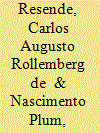

|
|
|
|
|
| Summary/Abstract |
The Brazilian-Argentine Agency for Accounting and Control of Nuclear Materials (ABACC) is a unique bilateral nonproliferation regime created by Brazil and Argentina after a long process of negotiations and confidence building. The creation of the agency in July 1991 marked a paradigmatic shift in the Brazilian-Argentine relationship, converting their long rivalry into a profound strategic partnership. This article presents a historical overview of the creation of ABACC and discusses how it paved the way for the integration of Brazil and Argentina into the nonproliferation regime. The article also shows how ABACC tackled nonproliferation challenges in the twenty-first century, helping Brazil and Argentina continue their nuclear programs with fewer risks to the autonomy and development goals traditionally defended in their foreign policies.
|
|
|
|
|
|
|
|
|
|
|
|
|
|
|
|
| 2 |
ID:
137286
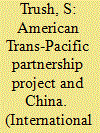

|
|
|
|
|
| Summary/Abstract |
THE TRANS-PACIFIC PARTNERSHIP (TPP) initiative was first launched by New Zealand, Singapore and Chile in 2003. Since the United States joined the process in 2011, this concept, significantly reformatted and with an expanded membership, has been regarded as a purely American one. It is also rightly seen as a (if not the) key element of the strategic shift of focus in U.S. foreign policy to the Asia-Pacific Region. It is also often viewed in conjunction with the conceptually symmetrical Transatlantic Partnership between the United States and the European Union. Many experts argue - with varying degrees of credibility - that the combination of these two initiatives is of central, systemic importance to the foreign-policy and foreign economic strategy of the Administration of Barack Obama.
|
|
|
|
|
|
|
|
|
|
|
|
|
|
|
|
| 3 |
ID:
123018
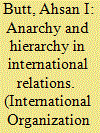

|
|
|
|
|
| Publication |
2013.
|
| Summary/Abstract |
This article questions the validity of anarchy as an assumption in International Relations theory. Powerful states often provide public goods to smaller states in return for their acquiescence on matters of interest. This transactional provision of public goods is analogous to how central governments behave in domestic environments; thus the hierarchic structure of domestic politics is replicated in international politics. The anarchy-hierarchy distinction, which rests on a neat separation of international and domestic structures, is therefore highly contentious. One public good that great powers provide, largely ignored by the literature on hierarchy, is justice. Powerful states can provide a forum for aggrieved parties to settle their disputes, and thus contain conflicts before they escalate to war. If such a forum is no longer provided, the system reverts to anarchy, where escalation-and therefore, war-is more likely. South America's war-prone decade can be explained by the variation in structural conditions on the continent. Due to the Depression, its Good Neighbor policy, and the onset of World War II, the United States was less interested in South American affairs in the 1930s, resulting in a more anarchic structure and a higher propensity for war.
|
|
|
|
|
|
|
|
|
|
|
|
|
|
|
|
| 4 |
ID:
146295
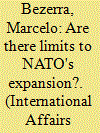

|
|
|
|
|
| Summary/Abstract |
THE EPICENTER of the earthquake that shatters Ukraine is located far beyond its dilemma of economic integration with the European Union or the Eurasian Union headed by Russia. The international dimension of this crisis (about which much has been already said in the post-Soviet epoch) concerns the defense and security issues or, to be more exact, the North Atlantic Treaty Organization's expansion to the east of Europe so that to tip the balance of power with Russia. This time NATO's persistent efforts at the borders of Russia produced two important events - an armed opposition in pro-Russian Donbass and reunification of Crimea with Russia, an event of historic consequence. This means that the project NATO is realizing in Ukraine as part of its security doctrine destabilized European security.
|
|
|
|
|
|
|
|
|
|
|
|
|
|
|
|
| 5 |
ID:
107103


|
|
|
|
|
| Publication |
2011.
|
| Summary/Abstract |
THE DECEMBER 2010 ISSUE of Negocies Estrangeiros, official biannual of the Portugal Diplomatic Institute at the Foreign Ministry of Portugal, carried a detailed analytical forecast by Joao Fabio Bertonha, professor of history at the State University of Maring (Brazil). The journal deals mainly with topical issues of Portugal's foreign policy, foreign economic activities and historical and cultural contacts with the rest of the world. It appears in Portuguese with some of the materials published in English.
Issue 18 deals with a selection of articles on various subjects and in different genres contributed by Portuguese and foreign authors; information materials coexist here with fundamental analytical studies, a veritable feast for inquisitive minds.
|
|
|
|
|
|
|
|
|
|
|
|
|
|
|
|
| 6 |
ID:
131995


|
|
|
|
|
| Publication |
2014.
|
| Summary/Abstract |
Within the scholarly debate on the current power transition in the international system, particular importance is attached to China's economic rise and the global shifts it is bringing forth in material primacy. A thorough understanding of these shifts in the relative distribution of power, however, requires leaving the narrow path of material capabilities and looking at normative accounts as well. Taking up this challenge, the article focuses on the political dimension of China's rise by exploring the country's alignment with South American governments along two dimensions: the convergence of their foreign policy ideas and the provision of diplomatic links facilitating their cooperation and coordination in global politics. The empirical analysis depicts a nascent global agenda forming between China and certain South American countries and shows that, along with growing levels of foreign policy compatibility, China has also advanced its diplomatic inroads into the region, particularly at the level of bilateral relations. Taking these developments as a whole, it is suggested that China has gained international attraction in terms of its visions of global order and as a potential political partner throughout the region. The article concludes with a discussion of the findings in light of the ongoing relative shifts in the distribution of global power beyond material primacy, and the prospects for China's further political rise.
|
|
|
|
|
|
|
|
|
|
|
|
|
|
|
|
| 7 |
ID:
123481
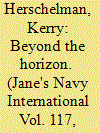

|
|
|
| 8 |
ID:
120536
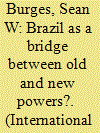

|
|
|
|
|
| Publication |
2013.
|
| Summary/Abstract |
Brazilian foreign policy demonstrates an interesting double aspect in the changing global system. Its rhetoric and overt positioning is framed around the idea of Brazil as a value-creating actor, while in reality there are significant value-claiming characteristics at the core of its approach to regional and global affairs.
The key for Brazil is its position as a 'bridge' between the South and the North, which allows its diplomats to establish the country as a critical coalition organizer and ideational leader for southern actors looking for major changes in global governance systems, and a central interlocutor for northern actors trying to cope with pressure from the South. Brazil's ambitions are simple: focusing more on an improved relative position, rather than a complete reformulation of the international system, which serves it well in economic, political and security terms.
To explain this argument the article focuses on Brazilian engagement with Africa and South America, as well as the country's approach to major negotiations such as the WTO's Doha round, the Free Trade Area of the Americas and the evolution of regional governance mechanisms such as the Organization of American States and the recently created Community of Latin American and Caribbean States. The pattern that emerges is one of Brazil working to create a consensus around its position, using its consequent leadership to improve Brazilian leverage in the regional and global arena.
|
|
|
|
|
|
|
|
|
|
|
|
|
|
|
|
| 9 |
ID:
121759
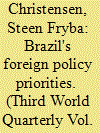

|
|
|
|
|
| Publication |
2013.
|
| Summary/Abstract |
As Brazil has risen to become an increasingly significant regional and global player in a world undergoing significant transformations in terms of power balance, the subject of its aims, world-view and foreign policy strategies is becoming increasingly relevant. This article focuses on the most important themes and priorities in Brazil's foreign policy orientation between 2003 and 2012 and connects these to the Brazilian government's world-view, its view of Brazil's role in the world, and to the main aims pursued by Brazil in its overall development strategy. I discuss how Brazil's view of the world and its foreign policy priorities relate to the USA's view and preferences, arguing that Brazil's foreign policy priorities reflect the fact that the USA and the West in general are often seen as barriers to Brazil's main aims. These are to achieve economic strengthening, a growing influence on the international political scene and a leadership position in South America, and through this to contribute to major changes in the global order.
|
|
|
|
|
|
|
|
|
|
|
|
|
|
|
|
| 10 |
ID:
184642
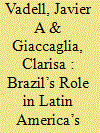

|
|
|
|
|
| Summary/Abstract |
At the beginning of the twenty-first century, Brazil became a crucial player as the principal advocate of South American integration. To Mercado Común del Sur (Mercosur) was added the Union of South American Nations (UNASUR), reaffirming regional policies around the idea of “South America.” Today, however, the withdrawal of Brazilian leadership along with the reversals and loss of focus in UNASUR and Mercosur have damaged the credibility of the region’s initiatives, as well as finding South America’s common voice. Despite this, this article argues that Brazil has not entirely disengaged from the region or abandoned the principle of regionalism. Recognition of Latin America’s distinctive history the authors to construct a model that incorporates complexity and disorder in which Brazil’s institutional political development will have significant repercussions for the future of the region.
|
|
|
|
|
|
|
|
|
|
|
|
|
|
|
|
| 11 |
ID:
111751
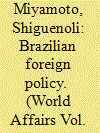

|
|
|
| 12 |
ID:
153893


|
|
|
|
|
| Summary/Abstract |
Focusing on the tenure of the Workers' Party (2003–16), we appraise the tensions between the Brazilian government and international nuclear governance mechanisms after the end of the Cold War. We examine three main dimensions of Brazilian nuclear policy: the search for autonomy and the affirmation of sovereignty, the economic-development rationale, and the security aspect. We present an interpretation of Brazilian nuclear policy within its broader cultural setting and the framing of foreign policy and international relations as defined by the ruling elite.
|
|
|
|
|
|
|
|
|
|
|
|
|
|
|
|
| 13 |
ID:
127600
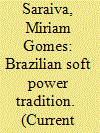

|
|
|
|
|
| Publication |
2014.
|
| Summary/Abstract |
Over the past decade, amid growing international fragmentation and declining US hegemony, Brazil has assertively expanded its participation in multilateral forums as part of a diplomatic strategy that envisions a reformulation of international institutions. At the same time, Brazil has also worked on building a leadership role within South America. These global and regional aims continue to shape the country's use of soft power. Indeed, soft power-defined by the political scientist Joseph S. Nye Jr. as influencing the behavior of others via attraction or persuasion rather than coercion or payment-is nothing new in Brazil's international dealings. Since the early 1900s, the nation has used such a strategy under different labels in conjunction with two beliefs central to its foreign policy: the need to build and assure Brazil's autonomy in its development strategy and foreign policy choices, and the desire to raise its global political profile
|
|
|
|
|
|
|
|
|
|
|
|
|
|
|
|
| 14 |
ID:
111757
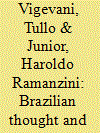

|
|
|
| 15 |
ID:
111750


|
|
|
| 16 |
ID:
130244
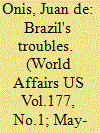

|
|
|
|
|
| Publication |
2014.
|
| Summary/Abstract |
With the extravaganza of the winter Olympic Games in Sochi over, the spotlight now turns to Brazil, the host of the FIFA World Cup championship in June. This tournament, the most widely viewed of global sports spectacles, is held every four years and involves thirty-two national teams, each of which has survived two years of regional competitions in Europe, Africa, Asia, and the Americas to reach the final play-offs. Starting on June 12th, sixty-four games will be played in four weeks, in stadiums all over Brazil, until the winner emerges in a final match on July 13th at the Maracanã, Rio de Janeiro's world-famous arena. Three million foreign fans are expected to visit Brazil, and billions of television viewers worldwide will watch the games. When the World Cup was awarded to Brazil in 2007-part of a remarkable parlay that included the award of the 2016 Summer Olympics to Rio as well-the country's economy was starting to boom as part of the BRIC upsurge that seemed ready to shake up international finance. The event was political from the onset, its significance potentially going well beyond the results on the playing fields where Brazil has won the world championship a record five times, a source of great national pride. But despite initial euphoria over being chosen to host the World Cup, Brazil is now experiencing doubts over whether it can pull off the event and second thoughts about the upsurge of influence on the international scene it was supposed to symbolize. The fervid devotion of Brazilians to soccer has made this country the Land of Football (as well as samba and Carnaval). Some non-Brazilian sports commentators have been baffled, therefore, by protest signs saying, "No to the Cup." But Brazil today is not just a land of football, it is also a land of public protests against corruption, heavy taxes, and deplorable public education and health services, cities with chaotic urban transport, markets with inflated consumer prices, and a dysfunctional political system that is manipulated by an elite for personal benefit.
|
|
|
|
|
|
|
|
|
|
|
|
|
|
|
|
| 17 |
ID:
124758
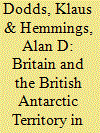

|
|
|
|
|
| Publication |
2013.
|
| Summary/Abstract |
Britain's contemporary and future relationship with the British Antarctic Territory and the wider region is the subject matter of this article. In the aftermath of the ill-fated plans for a merger of British Antarctic Survey (BAS) and the National Oceanography Centre, it is timely to ask how the UK projects influence and secures its scientific, resource and strategic interests. The contemporary Antarctic is increasingly characterized by tension over resource management and conservation politics as Antarctic Treaty parties disagree, both in private and public, over the purpose of legal instruments and the regulation of activities such as fishing and marine conservation. While we do not predict the collapse of the Antarctic Treaty System (ATS), our analysis suggests that the effectiveness and legitimacy of the ATS is increasingly under challenge. The United Kingdom's position as a claimant state and original signatory to the Antarctic Treaty is complicated by the presence of counter-claimants (Argentina and Chile) and a wider preoccupation with other overseas territories, such as South Georgia and South Sandwich Islands and the Falkland Islands. Polar science, carried out by BAS and other British agents, remains critical not only for maintaining the UK's 'soft power' but also increasingly for cementing a 'strategic presence' in the Antarctic. The article ends with a cautionary note: scientific excellence is no longer sufficient to guarantee geopolitical/strategic interests and there is growing evidence that claimant and non-claimant states alike are no longer regarding Antarctica as an area that will remain free of intensifying and diversifying resource exploitation.
|
|
|
|
|
|
|
|
|
|
|
|
|
|
|
|
| 18 |
ID:
128851
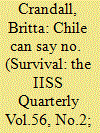

|
|
|
|
|
| Publication |
2014.
|
| Summary/Abstract |
Two recent books tell the story of the transition to Chile's now-vibrant democracy. Their complementary perspectives provide context for the choices Chileans made in last year's presidential elections. In an eerie confluence of fates, the two top contenders for Chile's presidency in late 2013, Michelle Bachelet and Evelyn Matthei, were actually childhood playmates. Their fathers, both air-force generals, had been friends and neighbours, but had contrasting political leanings and found themselves on opposite sides of the dictatorship that seized power in 1973. Mr Bachelet had become a high-ranking official in Salvador Allende's socialist administration, and was effectively tortured to death after the 1973 military coup that installed Augusto Pinochet as president. Mr Matthei, in contrast, was a rising star within the Pinochet regime, becoming head of the air force and ultimately working in the building in whose basement Mr Bachelet was detained and tortured. Thus, Michelle Bachelet and Evelyn Matthei represented not only two different futures, but two opposing pasts. While Bachelet promised free universal education and political reform, Matthei vowed to continue the policies of Chile's outgoing conservative president. The symbolism was anything but subtle.
|
|
|
|
|
|
|
|
|
|
|
|
|
|
|
|
| 19 |
ID:
125574
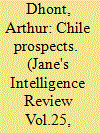

|
|
|
|
|
| Publication |
2013.
|
| Summary/Abstract |
Chilean voters head to the polls for a general election in November. Arthur Dhont discusses the potential for an energy crisis in the country as a result of ongoing protests, and looks at the impact the election results could have on future policy.
|
|
|
|
|
|
|
|
|
|
|
|
|
|
|
|
| 20 |
ID:
128396
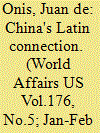

|
|
|
|
|
| Publication |
2014.
|
| Summary/Abstract |
When Brazil opened up its huge offshore petroleum discoveries to foreign developers in October, after holding off on a decision for six years, government leaks indicated that Chinese state oil companies would dominate the bidding for the estimated reserve of eight to twelve billion barrels of oil. When the bids were opened, however, the Chinese proved to be far more cautious than expected and took only a minority participation in the winning consortium dominated by Petrobras, the Brazilian state oil company, and two major Western multinationals, Royal Dutch Shell, the Anglo-Dutch giant, and Total, the largest French oil company.
|
|
|
|
|
|
|
|
|
|
|
|
|
|
|
|
|
|
|
|
|